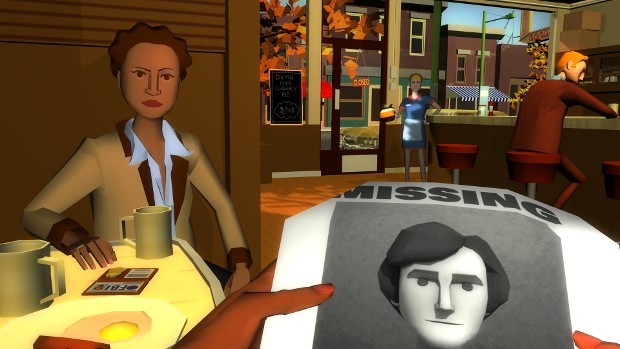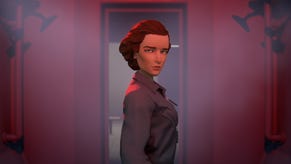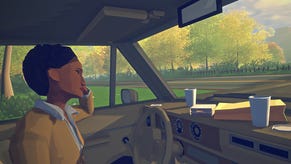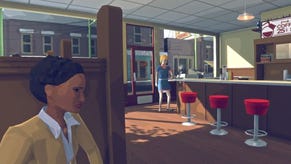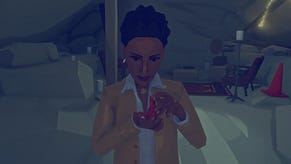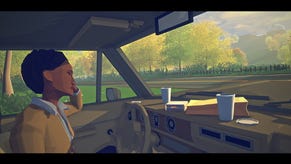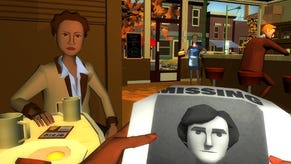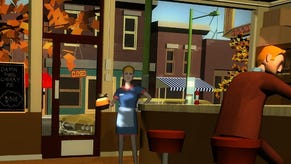A Mysterious State Of Mind: Virginia Interview
Murders, Mysteries, Mulholland
Virginia set up camp in our collective consciousness the moment we saw its stylish agents and what looked like a small town diner. Inspired by Twin Peaks, The Outer Limits and The X-Files, it's a game about the investigation into a missing person case in one of America's first States. This is an America in touch with its fictional history as well as its actual past, and I wanted to know more about how those influences will sit together, and how the game would actually play. I also took the opportunity to ask the team about a few of their favourite things. The team are designer/writer Jonathan Burroughs, animator/artist Terry Kenny and composer Lyndon Holland. Here are their answers.
RPS: Before we move onto the game can you tell our readers an interesting fact about Virginia the place rather than Virginia the game? If the fact were to contain subtle reference to events or characters in the game that would be acceptable.
Jonathan: It’s really hard to pick just one. We originally chose the Virginia setting because of the Quantico academy. Because we wanted our protagonist to be a graduate FBI agent in the Clarice Starling mold. But as we researched the South Atlantic States we just kept turning up fascinating historical references and cultural oddities. Locations like the Quiet Zone and the Sugar Grove facility and Virginia’s association with the intelligence and military industrial community.
The Great Dismal swamp (what a name!). Grace Sherwood receiving trial by water to determine if she was a witch. John Smith and the Powhatan. It’s legacy as the first colony and, in some respect, as the birthplace of the nation, the “Mother of Presidents”. I imagine this is familiar to most Americans, but it was interesting to learn that when Wilkes Booth shouted “Sic semper tyrannis!” from the stage of the Ford’s Theatre he was quoting the state motto of the Old Dominion. As we continued our research and developed the story it became clear to us that our exaggerated, abstracted Virginia would be as much a character as our two FBI agents.
RPS: How do a Londoner and a Dubliner come to be so interested in Americana? Has TV created a generation of creators?
Terry: As a kid everything I watched on the telly, that was exciting and the opposite of a grey rainy day in Dublin, was from the states. All the comics, the films and the games I loved, originated there. I've visited several times, and yeah that shiny wonderful place form the telly isn't real, but you can see what inspired it, and it is an incredibly interesting and exciting place to visit for a million other reasons.
Jonathan: I’ve been watching American TV since I was pre-school. I have weirdly vivid memories of building Lego spaceships in front of the telly while my mum watched Knots Landing on her lunch breaks. So it’s largely been a process of religious indoctrination.
I’m interested in confronting TV’s various fictional interpretations of American culture and acknowledging that it’s not representative of the America I read about in the news. That there are aspects of America worth commenting on and maybe even satirising. I hope that our removed perspective as non-Americans can be a useful thing, that it let’s us fashion a fictional America which is purposefully skewed by second hand experience.
As for television creating a generation of creators, I do see it commented on in reference to film, that most of us of television watching age probably possess an instinctive understanding of the language of cinema just by virtue of how much TV we watch. And I suppose the barrier to entry is lower than it’s ever been, at least in the west. A high end smartphone is more or less a portable movie studio.
It’s only tangentially related, but Brendon Chung did a remarkable job of incorporating cinematic devices into an interactive experience with Thirty Flights of Loving. We’ve certainly drawn inspiration from that.
RPS: Judging by the influences listed and the basic plot - a missing boy, FBI agents - Virginia is a mystery story. How does that particular genre apply in terms of play mechanics in this particular instance?
Jonathan: Detective work will be an aspect of the storytelling and you roleplaying as the main character. But on a bespoke basis, as suits the drama. There won’t be overarching systems based around gathering evidence or interrogating suspects.
RPS:: Detective dramas often rely on either providing the watcher/reader with information that the protagonists aren't privy to, or provide their detectives with almost supernatural powers of deduction so that they're several steps ahead. Do you try to solve the issue of maintaining mystery while supply the player with agency, or are investigations character- rather than player-driven?
Jonathan: You experience Virginia from the first person perspective. So to some extent that removes the god’s eye view that a filmed drama might choose to take. You’ll only be privy to what your character witnesses. And that permits us to reveal the mystery to the player at the pace the investigators are discovering it. However we’re still free to play with the chronology of events and the protagonist’s perception of time and reality. My favourite stories tend to be those which aren’t completely literal or leave something open to interpretation. It’s part of what draws me to David Lynch’s films. I hope we can achieve a measure of that with Virginia.
RPS: (tongue protruding through cheek, which cannot be seen via email) There's a chap at the counter in the diner screenshot. Presumably he's the player character. If not, who are the agents investigating the disappearance and where did they spring from?
Terry: Aghhh..no!... this is why people have a marketing department. You're the woman holding the missing boy poster.
Jonathan: And the woman seated opposite you is your partner in the case. You’ll spend most of the game together, but you’ll only play as the one character.
RPS: Twin Peaks, Outer Limits, X-Files - should we be expecting any supernatural and/or horror elements?
Jonathan: That would very much be a not unreasonable expectation.
RPS: How important is coffee (in the game or in life)?
Terry: I have a young child who is an early riser....so without coffee there would be no game. Within the game I don't know? We are fond of that coffee shop though and I think our first animation test was a guy drinking coffee...maybe we just lack imagination.
Lyndon: I have a love-hate relationship with coffee. I love it, but it hates me. Nowadays I try to stay away from it. One coffee in the morning can prevent me sleeping for sometimes up to two days. Maybe I should see a doctor about that…
Jonathan: In a moment of madness I bought some cinder toffee flavoured coffee a week or so ago. It’s really awful. I know very little about coffee except that I like it and I drink far too much of it, far too strong with too much sugar. But cinder toffee flavoured coffee is the worst. You have been warned.
RPS: The diner screenshot is from first-person perspective and the game is 'through the eyes' of the agent. Is it an FPS?
Terry: It's first person but we don't anticipate a lot of shooting. The story will be told from one agent’s perspective.
Jonathan: Walking simulator.
RPS: The Twin Peaks soundtrack is an integral part of the experience - like all the sounds that Lynch, Badalamenti et al cook up. I've only become acquainted with Lyndon Holland's work in recent days, but could you tell us anything about the musical style you're aiming for?
Lyndon: I have always been fond of the scores from late 80s/early 90s thrillers such as The Fugitive, Frantic, Bitter Moon and of course Blue Velvet and Twin Peaks. There is an interesting texture created when mixing live instruments with early digital synths. It's a very stylised sound that defines the era that Virginia is set in, but more than that I think it delivers a sense of surreality and otherworldliness that is central to our story.
For the sake of pacing, flow and dramatic impact, I'm keen to write longer cues that transition and evolve alongside the drama as opposed to the use of more self-contained and sporadic pieces. Hopefully the result will be a more holistic and cinematic experience.
RPS: When you state that you're influenced by giants of pop culture, how do you go about expressing your own identity? It's good company to keep but also casts a long shadow.
Terry: We set up Variable State to do things that we couldn't at other studios, and to make work that is personal to us. More than anything the chance to put our own identity on things is what motivates us, I hope that will just naturally come through in our work.
Jonathan: Referencing our inspirations has been a useful shorthand when explaining our game for the first time. But Virginia won’t be a parody or a pastiche. I’m really confident it’ll have a character and a quality all of its own, which should become apparent as we have the chance to show off more of what we’re up to.
RPS: Name your favourites of the following - feel free to include thoughts.
A) Outer Limits episode.
Terry: I think I was more in love with the opening of that show than I was with any of the episodes...perhaps it was seeing Poltergeist at a young age that had me terrified of the telly, but when that voice told me it was controlling the transmission, it had my attention. There is a Stephen King episode that comes to mind as a favourite though..The Revelations of Becka Paulson. It felt like a live action EC comic book, and was just a great mix of absurd and hokey horror.
Lyndon: I've not actually watched any episodes from The Outer Limits, but it is on my growing list of TV to watch this year!
Jonathan: I most vividly remember the two connected episodes Quality of Mercy and Light Brigade, the episodes with Agent Doggett and Wesley Crusher respectively. They’re not particularly relevant to what we’re working on now, but they stuck in my mind. As with Terry I think I was in love with the show’s opening, particularly the 90s remake’s opening, as much as the episodes. I loved that the show would pull the rug out from under you in some way by the end and everything would turn out for the worse.
B) Lynch film.
Jonathan: I want to reply Dune, slightly flippantly. I have such a fondness for that film. And for the novel. I love them both in entirely different ways. I snuck out of school with a couple of friends to see Mulholland Drive at the cinema. I can’t remember how that came to happen. I think we had a cross country run that afternoon or something similarly awful. We absolutely made the right choice.
Terry: Hmmm.. I think Lost Highway was the first Lynch movie I saw in the cinema and it made a huge impression on me. There is just something about the audacity of that movie to just go where it wants that makes me love it. I think Eraserhead might have been the first unapologetic, straight up art house film I've ever seen, I'm also a big fan of Blue Velvet, and The Straight Story.
Oh and that one minute short he did with the Lumiere camera (Ed: below) is just incredible…he crams so much into it, and it still drips with style despite the limitations.
Lyndon: Mulholland Drive. It's the best film I can think of that deals with themes of guilt and regret. For all its strangeness, I think it's a very precise piece of filmmaking.
C) X-Files episode.
Terry: This is really hard, I loved the idea of the show from the very first episode, but I think Ice was the first episode that felt like something really special. I don't think I can tie down one favourite though, so some of the others I like are, in no particular order… Paper Hearts and Drive, both Vince Gilligan episodes that are just great stand alone stories. Kill Switch? Cos it made my parents sit through a William Gibson story. X Cops...that was just so much fun to watch.
I have a soft for any of the funnier episodes, like Bad Blood or the two Dreamland episodes where Mulder switches bodies with a G man… oh and Quagmire… I just love the conversation the two of them have while they are stranded out on that rock.
Lyndon: There are so many, but maybe the connecting episodes in the 3rd season Nisei and 731. I'm a big fan of the monster of the week, but ultimately there always seemed to be more at stake emotionally in the overarching conspiracy episodes.
Jonathan: I mentioned this in the comments thread of the RPS piece covering the Virginia announcement, but it’s absolutely Darin Morgan’s episode Jose Chung’s From Outer Space. It was such an oddity. The pre-title sequence is fantastic. And the episode was funny and metatextual. You’d see that kind of self-awareness all the time in shows like Buffy, but before From Outer Space I’d never seen a TV show deconstruct itself and it’s medium like that. And do it whilst being coherent and interesting in its own right.
D) Twilight Zone episode - you didn't mention it in your influences but it's my favourite so cannot be denied.
Terry: Yup..love this show...I remember other kids recounting episodes to me when I was quite young, before I'd ever seen the show, and even then, when they were being retold like that, they were chilling. They all had such satisfying twists too.
I think so many films and how still owe a lot to that show... Favourite episodes? Room 22. I know Nightmare At 20,000 Feet is an obvious one but it is still great, and that creature still freaks me out, both of these may be to blame for my fear of flying. Walking Distance, because it is just such a nice piece of storytelling. I think the episode with the doppelganger, Mirror Image, is strangely frightening as well. That show had a habit of helping me discover new things to be unsettled by and there are very few episodes I've seen that didn't hang around in my head for a few weeks after.
Lyndon: Judgement Night.
Jonathan: I’ve seen shamefully few episodes of the Twilight Zone apart from Terror at 20,000 Feet. I did watch all of The Obsolete Man the other day, which has great performances from Fritz Weaver and Burgess Meredith, but is otherwise a bit too Nineteen Eighty-Four for it’s own good. Can my favourite Twilight Zone episode be this amazing interview with Rod Serling from 1959 (Ed: It certainly can be, it's just below and it's brilliant, subversive and inspirational. A hero.)?
RPS: What the heck is going on with Phillip Jeffries? Is it possible that David Bowie was improvising the disappearances and hallucinations?
Jonathan: I think he’s still in stuck in a hotel in Buenos Aires, his escape eternally consigned to the cutting room floor.
RPS: Finally, what are your thoughts on Fire Walk With Me (full disclosure: I love it)?
Jonathan: Chris Isaak!
Lyndon: I was quite surprised by how tonally different it was from the series, and perhaps I would have preferred the film to continue from where the series left off rather than it be a prequel. I sort of felt I already knew most of the story regarding Laura Palmer's death and so it was a little bit frustrating at times. That said, there are some absolutely harrowing scenes that chill me to the bone!
Terry: Fire Walk With Me is the reason I will never hang a picture that has a door on it in my house.
RPS: Very sensible. Thanks for your time!


